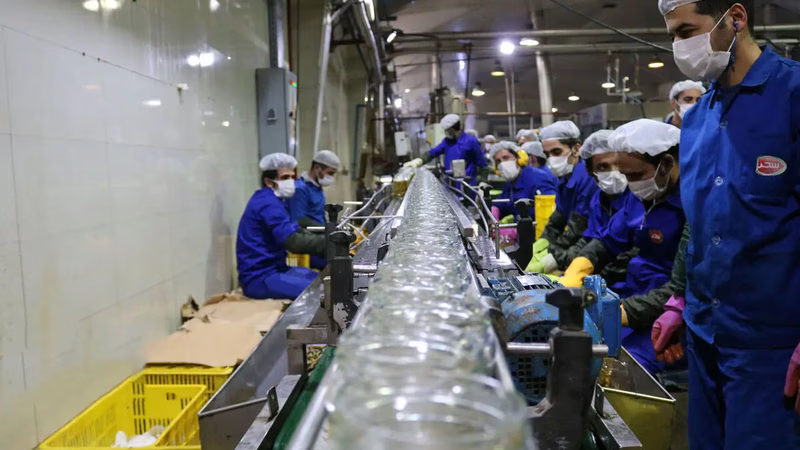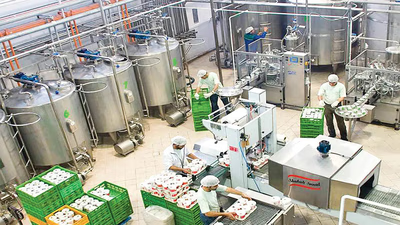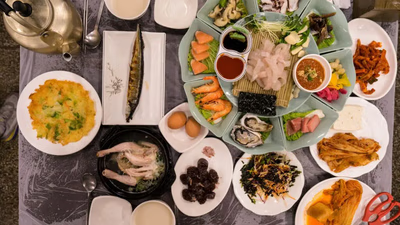
Asian food manufacturers produce diverse products like snacks and beverages.
Asian food manufacturers produce a vast array of products, including processed foods, snacks, beverages, sauces, seasonings, noodles, rice products, frozen foods, dairy products, and confectionery items. These products often reflect the diverse cuisines of different Asian countries, such as Chinese, Japanese, Korean, Thai, Indian, and Vietnamese. Asian food manufacturers often combine traditional recipes and techniques with modern technology and innovation. They strive to maintain the authentic flavors and characteristics of traditional dishes while meeting the demands of convenience, shelf life, and quality standards. This balance between tradition and innovation helps them cater to both traditionalists and those seeking new food experiences.
Asian food manufacturers focus on maintaining high quality and safety standards. They adhere to local regulations and often follow global food safety certifications, such as ISO and HACCP. Quality control measures are implemented throughout the production process, including sourcing ingredients, processing, packaging, and distribution. Asian food manufacturers have well-equipped production facilities that utilize advanced machinery and technology. These facilities are designed to handle large-scale production to meet the demands of both domestic and international markets. Many manufacturers have invested in automation and efficient manufacturing processes to ensure consistency, efficiency, and cost-effectiveness.
Asian food manufacturers have a strong export-oriented approach, targeting global markets. They leverage their expertise in Asian flavors and cuisines to cater to the growing demand for Asian food products worldwide. This has led to the availability of Asian food products in supermarkets, restaurants, and online platforms in various parts of the world. Asian food manufacturers often engage in private label and contract manufacturing. They work with retailers, food service providers, and other companies to develop and produce customized food products under their respective brands. This allows for greater flexibility in meeting specific requirements and market demands.
Today, Asia has become one of the hubs of food production in the world, and some of its food production brands are among the world's most prestigious brands. These factories and food product manufacturers all produce independently. It should be noted that the information and statistics presented here are as of the time of publication of this article and will certainly change in the future. Mitsubishi is one of the companies based in Tokyo. In addition to commercial activities, this trading company plays an important role in various matters such as food supply in the Asian continent. Mitsubishi supplies a significant part of food in China and many Asian countries. Tsing Tao Company is the largest brand of beverage producer in China. This company was founded in 1903 by a German company and currently occupies 15% of China's domestic market.
According to the research conducted by the Euro Monitor market, today the Iranian brand Kale is ranked among the 50 world food supply brands, along with many well-known global brands such as Dent, Maggi, etc. Kale brand has taken the 48th place in the world food industry. Asiashore Food Industries operates in the field of food production with the Iranian brand Taravat. With the production of 13 product groups and more than 120 types of diverse and high-quality packaging, this company is one of the companies that provides a complete product basket to the consumer. The freshness of product exports to Canada, Holland, Malaysia, Turkey, Afghanistan and Iraq is in its portfolio.
Many Asian food manufacturers are increasingly focusing on sustainability and traceability in their operations. They adopt environmentally friendly practices, such as waste reduction, energy efficiency, and responsible sourcing of ingredients. Additionally, some manufacturers implement traceability systems to provide transparency and ensure the authenticity and safety of their products. Asian food manufacturers actively engage in research and development to introduce new products and flavors to the market. They invest in product innovation, recipe development, and consumer insights to understand evolving consumer preferences and trends. This enables them to create unique and innovative food products that meet changing consumer demands.
-

West Asian countries are advancing their food production through modern agricultural practices, including advanced irrigation, hydroponics, and greenhouse cultivation. These methods optimize water use and increase crop yields, particularly in arid regions. The region is also seeing a rise in organic farming, driven by consumer demand for healthier options and sustainable practices. To enhance food safety, traceability systems are being implemented, allowing for the tracking of food products from farm to consumer. The growth of food technology startups is transforming the industry, utilizing AI, blockchain, and data analytics for improved production and distribution. The food packaging industry is evolving, focusing on modern devices to reduce human intervention and enhance efficiency. With a diverse food industry that includes sectors from dairy to snacks, the emphasis on quality packaging and storage methods is crucial for maintaining product integrity. Governments are enforcing stricter food safety regulations, while investments in food processing technologies are increasing.
This includes the development of ready-to-eat meals and convenience foods to meet changing consumer lifestyles. Sustainable packaging solutions are gaining traction, with techniques like modified atmosphere packaging being adopted to prolong shelf life. Additionally, robust cold chain infrastructures are being established to ensure the quality of perishable goods, reflecting a commitment to food safety and quality in the region.
-

Water scarcity is a pressing issue in the Middle East, impacting agricultural productivity and food security. Countries in the region are increasingly reliant on food imports to satisfy domestic needs, leading to vulnerabilities in the face of global price fluctuations and supply chain disruptions, as highlighted during the COVID-19 pandemic. Innovative solutions such as water desalination and drip irrigation are being implemented to mitigate water scarcity. The food industry plays a crucial role in employment and economic value creation in West Asia, with potential for growth due to favorable agricultural conditions and access to quality raw materials. However, ongoing conflicts, such as the war in Syria and the Ukraine crisis, exacerbate food insecurity by disrupting grain supplies and increasing prices. Malnutrition and dietary challenges persist, driven by lifestyle changes and economic factors. Climate change poses additional risks, affecting agricultural productivity and livestock rearing. Addressing food waste is also critical, as significant losses occur throughout the supply chain. Overall, enhancing local agricultural production, diversifying food sources, and implementing sustainable practices are vital for improving food security in the Middle East.
-

Halal food, essential in Middle Eastern cuisine, adheres to Islamic dietary laws, prohibiting pork and alcohol while emphasizing specific preparation methods. Staples like rice, wheat, and legumes form the foundation of many dishes, complemented by flatbreads such as pita and naan. Hospitality is paramount, often showcased through communal meals featuring roasted meats. The cuisine is characterized by grilling, roasting, and slow cooking, with popular dishes including shawarma and kebabs. Middle Eastern food is renowned for its freshness, health benefits, and aromatic qualities, leading to a global interest in its recipes. Mezze, a style of dining with small shared plates, highlights various dips and appetizers. Spices like cumin and cardamom, alongside herbs such as parsley and mint, enhance the flavors of lamb, chicken, and beef dishes. Desserts like baklava and kunefe showcase the region"s rich culinary traditions.
Coffee and tea play significant roles in social interactions, with traditional preparation methods reflecting the region"s hospitality culture. The global appeal of Middle Eastern cuisine continues to grow, driven by its unique flavors and health-conscious ingredients.
-

Asian cuisine is characterized by its diversity and bold flavors, with rice and noodles as staples across many countries. Fresh, seasonal ingredients play a vital role, enhancing both taste and nutritional value. Cooking techniques like stir-frying preserve the texture and nutrients of food. The Asian food market is rapidly expanding, projected to double to over $8 trillion by 2030, driven by a growing middle class and increasing consumer spending. The return of restaurant dining post-pandemic has further fueled this growth. Countries like Japan and Thailand are seeing a rise in food enthusiasts, impacting the global food industry. Street food culture is integral, showcasing local flavors and offering diverse options. Each region has unique culinary traditions, with common elements such as the use of various condiments and spices.
As consumer health awareness rises, there is a shift towards plant-based alternatives, particularly in markets like Singapore, Japan, and China. The food industry in Asia, especially in basic products and seasonings, significantly contributes to the region"s economic prosperity."
-

West Asia faces significant challenges in food production due to arid climates, limited water resources, and urbanization, which restrict agricultural activities. The region"s reliance on food imports makes it vulnerable to global price fluctuations and trade disruptions. Climate change exacerbates these issues, leading to crop failures and livestock losses. Political instability further complicates the situation, disrupting supply chains and causing food shortages. The ongoing conflict in several Middle Eastern countries has led to high food prices and increased food insecurity. The region"s growing population and shifting dietary preferences towards resource-intensive foods heighten the demand for a diverse and sustainable food production system. Inadequate infrastructure and post-harvest management contribute to significant food waste, compounding the challenges of ensuring food security. As countries like Morocco leverage their fertilizer production capabilities, there is a pressing need for effective monitoring of food supply chains and strategic regulation to support local producers and meet consumer needs.
The food industry, while essential, faces pressures that often compromise product quality. Companies like Poya Vision prioritize health and quality in food imports, highlighting the importance of sustainable practices in addressing the region"s food security challenges."
-

Asian food manufacturers produce a wide range of products, including snacks, beverages, and processed foods, reflecting the diverse cuisines of the region. They blend traditional recipes with modern technology to ensure authenticity while meeting contemporary demands for convenience and quality. These manufacturers adhere to strict quality and safety standards, following local regulations and global certifications like ISO and HACCP. With advanced production facilities and a strong export-oriented approach, they cater to both domestic and international markets. Many engage in private label and contract manufacturing, allowing them to customize products for retailers and food service providers. Sustainability and traceability are increasingly prioritized, with manufacturers adopting eco-friendly practices and implementing systems to ensure product authenticity. Research and development play a crucial role in introducing innovative products that align with evolving consumer preferences. Notable companies like Mitsubishi and Tsing Tao lead the industry, showcasing the prominence of Asian food brands globally. Overall, the Asian food manufacturing sector is a dynamic and growing hub, contributing significantly to the global food supply.






